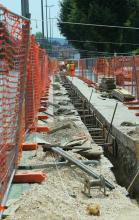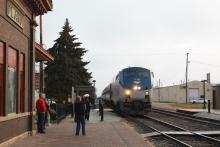
OnLight Aurora, the nonprofit ISP serving Aurora, Illinois via publicly owned infrastructure, is bringing more companies to the second largest city in the state.
"One Of The Reasons We're Here"
Scientel Solutions, a wireless communications company with headquarters in Lombard, Illinois, is making a move to Aurora. The company plans to build its own 12,000 square foot office building and an accompanying warehouse in the community where they will be near a local data center.
The data Cyrus One data center was only one reason Scientel chose Aurora, according to the company’s attorney Richard Williams:
“In addition to being near Cyrus One, Williams told aldermen the company also was lured by OnLight Aurora, the city's fiber optic network.”
"Fiber was a big attraction to us," Williams said. "That's one of the reasons we're here."
Rather than continue to lease its Lombard location, the company has decided to invest in its own property. In addition to constructing the facilities, Scientel will erect a communications tower on its new site. Lombard is approximately 25 miles east of Aurora, closer to downtown Chicago.
Scientel will bring 30 Lombard employees to Aurora and hire 20 more employees to work at the new headquarters.
Unexpected Benefits
Back in 1995, city leadership decided to invest in publicly owned infrastructure to reduce telecommunications costs, upgrade to a faster network, and obtain the reliability they couldn’t get from incumbents. At the time, the city used patchwork of different connections and while some facilities obtained adequate connectivity, others in the more far-reaching areas of the community depended on old leased lines that weren’t up to task. Employees in some offices traveled to offices where connectivity was better in order to complete specific tasks that required better connections.
Rather than continue to pay $500,000 per year to telecommunications providers to pay for multiple leased lines, community leaders saw the wisdom in fiber optic investment. Construction on the 60-mile network started in 2008, lasted for three years, and allowed Aurora to save $485,000 per year on telecommunications costs. The final cost to deploy was approximately $7 million.
While the original goal was to cut municipal costs and improve connectivity for the city, the network has generated other benefits. In 2011, the network attracted a $12 million grant from the Federal Highway Administration to upgrade traffic signals as part of an Intelligent Traffic System (ITS). The grant allowed Aurora to pay off the original cost of deployment.
In 2012, the city’s broadband task force formed nonprofit ISP OnLight Aurora. The organization has driven better connectivity for community anchor institutions (CAIs), schools, and businesses. Learn more about the community and OnLight Aurora by listening to Christopher’s conversation with Alderman Rick Mervine in episode 123 of the Community Broadband Bits podcast from 2014.







